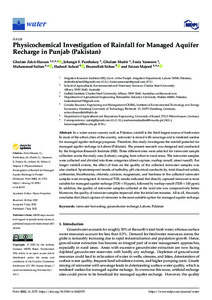Physicochemical Investigation of Rainfall for Managed Aquifer Recharge in Punjab (Pakistan)
| dc.date.accessioned | 2022-08-08T10:56:43Z | |
| dc.date.available | 2022-08-08T10:56:43Z | |
| dc.date.issued | 2022-07-07 | |
| dc.identifier | doi:10.17170/kobra-202208086587 | |
| dc.identifier.uri | http://hdl.handle.net/123456789/14033 | |
| dc.description.sponsorship | Gefördert durch den Publikationsfonds der Universität Kassel | |
| dc.language.iso | eng | |
| dc.rights | Namensnennung 4.0 International | * |
| dc.rights.uri | http://creativecommons.org/licenses/by/4.0/ | * |
| dc.subject | rainwater harvesting | eng |
| dc.subject | groundwater recharge | eng |
| dc.subject | Lahore | eng |
| dc.subject | Pakistan | eng |
| dc.subject.ddc | 630 | |
| dc.title | Physicochemical Investigation of Rainfall for Managed Aquifer Recharge in Punjab (Pakistan) | eng |
| dc.type | Aufsatz | |
| dcterms.abstract | In a water-scarce country such as Pakistan, rainfall is the third-largest source of freshwater. In most of the urban cities of the country, rainwater is mixed with sewerage and is rendered useless for managed aquifer recharge purposes. Therefore, this study investigates the rainfall potential for managed aquifer recharge in Lahore (Pakistan). The present research was designed and conducted by the Irrigation Research Institute (IRI). Three different sites were selected for rainwater sample collection across the study area (Lahore), ranging from urban to rural areas. The rainwater samples were collected and divided into three categories (direct capture, rooftop runoff, street runoff). For longer rainfall events, the effect of time on the quality of the collected rainwater samples was also studied. Spatiotemporal trends of turbidity, pH, electrical conductivity, total dissolved solids, carbonates, bicarbonates, chloride, calcium, magnesium, and hardness in the collected rainwater samples were investigated. In terms of TDS, results indicated that directly captured rainwater is most suitable for managed aquifer recharge (TDS < 50 ppm), followed by rooftop runoff (TDS < 100 ppm). In addition, the quality of rainwater samples collected at the rural site was comparatively better. Moreover, the quality of rainwater samples improved after the initial ten minutes. All in all, this study concludes that direct capture of rainwater is the most suitable option for managed aquifer recharge. | eng |
| dcterms.accessRights | open access | |
| dcterms.creator | Zakir-Hassan, Ghulam | |
| dcterms.creator | Punthakey, Jehangir F. | |
| dcterms.creator | Shabir, Ghulam | |
| dcterms.creator | Yasmeen, Fozia | |
| dcterms.creator | Sultan, Muhammad | |
| dcterms.creator | Ashraf, Hadeed | |
| dcterms.creator | Ihsanullah, Sohoo | |
| dcterms.creator | Majeed, Faizan | |
| dc.relation.doi | doi:10.3390/w14142155 | |
| dc.subject.swd | Regenwasser | ger |
| dc.subject.swd | Punjab (Indien) | ger |
| dc.subject.swd | Punjab (Pakistan) | ger |
| dc.subject.swd | Bewässerungswirtschaft | ger |
| dc.subject.swd | Wasserstoffionenkonzentration | ger |
| dc.subject.swd | Grundwasser | ger |
| dc.subject.swd | Süßwasser | ger |
| dc.subject.swd | Wassergewinnung | ger |
| dc.subject.swd | Pakistan | ger |
| dc.type.version | publishedVersion | |
| dcterms.source.identifier | eissn:2073-4441 | |
| dcterms.source.issue | Issue 14 | |
| dcterms.source.journal | Water | eng |
| dcterms.source.volume | Volume 14 | |
| kup.iskup | false | |
| dcterms.source.articlenumber | 2155 |
Dateien zu dieser Ressource
Das Dokument erscheint in:
-
Artikel [1186]


